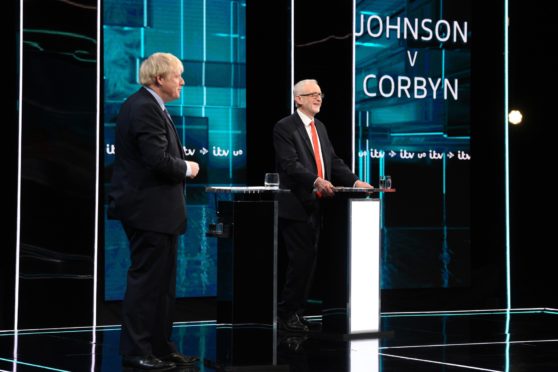Boris Johnson said maintaining the Union was more important than Brexit as he clashed with Jeremy Corbyn in tonight’s ITV leader’s debate.
The prime minister accused the Labour leader of planning a “coalition of chaos” with the SNP as Mr Corbyn declined to make the same commitment to the United Kingdom.
During a stormy encounter, both leaders were laughed at by the studio audience during the first debate of the General Election campaign.
Laughter erupted when Mr Johnson claimed that the truth mattered during the campaign, following the question marks that have arisen about his conduct and personal life.
Mr Corbyn was jeered when he repeatedly dodged Mr Johnson’s questions on which side he would campaign on in a second referendum on EU withdrawal.
In his opening statement, Mr Johnson argued that voting the Conservatives into power next month would deliver a quick Brexit deal, which was supported by all of his 635 candidates.
“As soon as we can get that deal through parliament in the next few weeks we can get on with the people’s priorities and that’s the choice: that or dither and delay, deadlock and division under a Corbyn/Sturgeon coalition with two referendums, one on the EU then another one on Scotland, causing endless national misery,” Mr Johnson said.
Mr Corbyn indicated that the Union was at risk when the leaders were asked if it was worth sacrificing for Brexit.
The Labour leader argued that Mr Johnson’s deal created a border between Ireland and Northern Ireland and different customs arrangements between the two countries.
“He (Boris Johnson) promised the Democratic Unionist Party he would never do that,” Mr Corbyn said.
“Clearly there is an issue there. This deal is damaging to this country.”
But Mr Johnson claimed Mr Corbyn had “probably already done a deal” with Ms Sturgeon to form a coalition, warning the price of the deal would be a second referendum.
Debate Moderator Julie Etchingham then asked both men if the Union was more important that Brexit.
Mr Corbyn failed to answer the question directly, saying he would not do any deals with the SNP and adding “Our country is obviously very important”.
To the same question, Mr Johnson answered: “The Union is the most important. It is a fantastic thing.
“I’m proud to be prime minister and minister for the Union.
“Jeremy Corbyn has said he is open to a second referendum on Scotland early in the lifetime of the government and Nicola Sturgeon has made it absolutely clear that the price of her support would be a referendum in 2020.
“So you are going to have a year of two referendums.”
When asked if there would be a second referendum and when it would be held, Mr Corbyn said there would not be a vote in the “early years” of a Labour Government.
Mr Corbyn disputed Mr Johnson’s claims that he could engineer a swift Brexit, saying it would take seven years to complete a trade deal with the US.
The Labour leader also accused the prime minister of getting ready to sell the NHS to the US, producing documents, obtained under Freedom of Information legislation, to back-up his argument.
Halfway through the encounter, the two men were persuaded to shake hands in an attempt to demonstrate their commitment to working towards a calmer kind of politics following the hostility of recent years.
The rancour began before the debate, with the SNP and Lib Dems complaining vociferously that neither Nicola Sturgeon nor Jo Swinson was able to take part.
Earlier this week the SNP and the Liberals lost a High Court challenge against ITV over its decision to exclude their party leaders from last night’s encounter.
Analysis
With typical bravado, Boris Johnson proclaimed that he was “pumped” and “like a coiled spring” in the run-up to tonight’s debate.
Central to his strategy for taking on Jeremy Corbyn was to put the United Kingdom at the heart of the message.
Mr Johnson’s advisers had no doubt observed Mr Corbyn’s desperately indecisive twists and turns on the issue when the Labour leader came to Scotland last week.
Therefore TV viewers heard Mr Johnson say the Union was more important than Brexit, a statement that will appeal enormously to Tory candidates defending seats north of the border.
Mr Corbyn, in contrast, declined to make a similar commitment, which merely added to the impression that he is unwilling to answer the burning issues of the day.
That impression was reinforced by the Labour leader’s unwillingness to say whether he would campaign for Leave or Remain in a second referendum.
